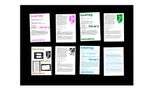User talk:Simon/Inviting
bootleg library sessions, 27.11.19-04.12.19
A transcription of a pad used to write introductory text for the first bootleg library sessions.
Source pad here: https://pad.xpub.nl/p/Bootleg_Library_Workshop_Sessions
Date & Time:
27.11.19: 10:20-11:50
28.11.19: 10:00-11:00
04.12.19: 10:00-11:30
Location:
04.128 (A small office in the drawing station, by the printer)
Things to bring: a computer (or a USB drive) with some of your favourite texts on it, a cup for tea or coffee if you want some (there will be spare cups if needed)
bootleg library sessions
During these sessions, we'll have an introduction to the bootleg library, and create user accounts. Once you have a user account you will have full access to useful features of the library, such as arranging the collection through public and private "shelves", as well as downloading and uploading texts. If we have time, we can discuss the things we're reading, and how we'd like to use this library. These sessions are free and open for all to attend, and tea, coffee and snacks will be provided.
about the bootleg library
The bootleg library is a local collection of texts, available in digital (mostly PDFs and EPUB) and physical (printed) form. The digital library is available over a local network, at this URL: http://145.24.131.15:20190. Much of the collection has been “bootlegged”, meaning that the books have been copied, modified, and redistributed, unauthorised, as fairly faithful reproductions of a source publication.
The physical library is a growing collection of republished books, mostly made by Simon Browne (XPUB), sometimes donated by visitors. These books, currently stored in a box on a shelf in the Lens-Based studio, are available to be read, borrowed and annotated, with a condition that they are returned.
The digital library runs on calibre-web https://github.com/janeczku/calibre-web, a web interface for Calibre, which is open-source software for ebook management. Calibre allows storage and conversion of ebooks in many file formats, which can all be listed under the one catalogue entry, providing a diversity of formats for different reading needs; print, full text search, copy/paste, hyperlinked references, etc. The software also allows users to manually or automatically enter cataloguing details, and create and edit "shelves". These shelves are either public or private, so users may organise the collection together, and also create their own sections of books that are individually organised.
The bootleg library has a smaller collection than many other libraries, but it is personalised, collective, and local. It has a curated collection of eclectic texts, individually uploaded and catalogued by readers who want to share them. Readers, and the texts they read, are represented in the library, and by way of alternative library practices this representation produces a certain kind of sociability. Through using this library, readers and texts become active participants in the collection. If you know the person you know something about the book, and vice-versa, or if you don't there is the opportunity to find out more.
The conditions for uploading are that;
- the contributor is familiar with the text, and
- the contributor completes the metadata on each upload
Most important are the description and page fields; these are completed subjectively. Texts are tagged with keywords that indicate the subject, such as “Media Theory”, “Fiction”, “Technical manuals” etc., and also (if applicable) the person who referred them, which can be the contributor, or another person e.g. “Amy’s books”, “Steve’s books”, “Simon’s books” etc. Anyone who is on the local network and knows the URL can download or upload texts, but only those with a user account will have access to its more useful features, such as the ability to create and edit public and private “shelves”, which is how the collection may be both collectively, and individually organised.
During these workshops, we will engage in a variety of activities;
- creating user accounts
- collectively determining the development of desired features in the library
- uploading and cataloguing texts
- classifying texts in shelves, both public and private
- downloading, reading, annotating and discussing texts
- digitising printed matter, including scanning and OCR
- designing, printing and binding books for the physical bootleg library
The Bootleg Library represents its readers through various strategies;
- a horizontal approach to classification through collective organisation of public shelves
- personalisation of the catalogue through subjective descriptions and tags, elevating the position of the reader in regard to texts
- ability to navigate the collection through the sociability of its users - if you know a person whose name appears as a tag in the metadata, you know something about the text, and vice-versa
- development of a collection and interface made by and for its readers, containing texts that are personally chosen and shared within our community
The workshop sessions are open to all who are interested, and will be published on the media design calendar. Registration is not necessary, but please refer to the calendar entries for any other specific requirements for each workshop.

